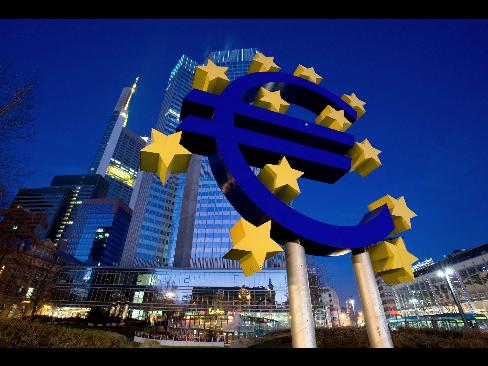
European Central Bank's bond buying operation could re3ach €850bn according to analysts at the Royal Bank of Scotland.
Letter to Italian PM Silvio Berlusconi demanded detailed list of reforms to timetable set by the bank.
The European Central Bank’s decision to start buying up Italian and Spanish bonds has controversially extended its operations into detailed demands for economic restructuring, it has emerged.
Acting against the advice of Germany’s Bundesbank, the ECB has been drawn into a role in the markets that had been intended for the eurozone governments’ bailout fund, the European Financial Stability Facility (EFSF).
The ECB bond buying operation – which could reach €850bn (£740bn) according to analysts at RBS – has also transferred significant risk to the balance sheet of an organisation that has traditionally stuck to its remit of controlling inflation.
Behind the scenes, moreover, it has begun to dictate – and in reportedly meticulous detail – the policies to be followed in one of Europe’s biggest economies.
Before mounting the intervention that drove down Italian and Spanish borrowing costs on Monday, the ECB had spent some €75bn buying the debt of Greece, Ireland and Portugal. Under the terms of an agreement struck by eurozone leaders last month, however, the bank’s bond-buying powers are to be assumed by a reformed EFSF.
It had been hoped that the changes could be ratified before contagion threatened Spain or Italy. But with parliaments in recess and European leaders on holiday, the overhaul of the fund is unlikely to be approved much before the end of September. “We cannot go any faster,” France’s finance minister Francois Baroin told Europe-1 radio.
But the latest move appears to have involved the ECB in far more than buying bonds. According to the Italian daily, Corriere della Sera, the bank’s president, Jean-Claude Trichet, and his successor-designate, the governor of the Bank of Italy, Mario Draghi, sent a letter to Italy’s prime minister, Silvio Berlusconi, at the end of last week dictating the terms on which the ECB was prepared to buy Italy’s increasingly costly debt.
The paper said the bank’s demands almost amounted to a new government programme: “The level of detail in the letter must have astonished even the recipient. There are the measures to be taken; there is the timetable according to which they must be implemented. Not even the legislative instruments that the ECB asks the government to use have been left out.”
They included liberalisations, to be imposed by decree; privatisations, including those of companies owned by local authorities, to be started immediately, and sweeping reforms of the labour market to abolish the rigid distinction between cosseted “insiders” in permanent employment and “outsiders” on short-term contracts with few rights and scant entitlements. It is not clear whether Berlusconi’s announcement on Friday of a new fiscal initiative was taken in response to the Trichet-Draghi letter. The prime minister, who has not interrupted his summer holiday, vowed to bring forward new measures to eliminate Italy’s budget deficit.
Pierluigi Bersani, the leader of Italy’s biggest opposition group, the Democratic party, demanded to know the full contents of the letter. “It is incredible and unacceptable that the opposition has until now not had any account of the conditions being imposed upon us by the European and international communities,” he said.
The ECB’s bond-buying programme attracted criticism from analysts. Michael Schubert, an economist at Commerzbank, said the bank’s new operations not only risked losses on the bonds, but its reputation as an inflation-fighting monetary authority.
“If people do not believe or are convinced that the ECB is supporting governments, then this could be a severe loss in reputation and the consequences would be that inflation expectations would go up.”
In France, European leaders were strongly criticised for remaining on holiday while the single currency crisis has unfolded.While Berlusconi is in Sardinia, the French president, Nicolas Sarkozy, who also holds the G7 presidency, is on holiday in the south of France, while the German chancellor, Angela Merkelis walking in the Sud Tyrol.
Former French finance minister Jean-Louis Borloo said it was vital for the G8 and G20 nations to meet “urgently … at the level of heads of state” to solve the economic crisis.
“The moment is historic and we have to act quickly,” he told Le Figaro newspaper. He urged Sarkozy, currently on holiday with his pregnant wife, Carla Bruni-Sarkozy, to convene the meetings: “The situation is such that the European executive must reunite in the coming days and that national parliaments are convened at the same time. We have to get parliaments involved as soon as possible.”
Borloo came up with four solutions to the crisis: a “massive intervention” of Europe’s main banks, especially the European Central Bank; the setting up of an “anti-speculation stabilisation fund”– fed by a tax on financial transactions; the “cleaning up” of public finances in western economies, and the “organisation of international financial regulation”.
Professor Eric Heyer, of the Centre for Economic Research of the respected Sciences Po university in Paris told the Guardian he feared the holidaying politicians and bureaucrats were sending the wrong signals and making an already bad financial crisis worse.
“What we need is action and action now,” he said. “If they address these problems now, if they show there is someone running things, they will kill off the speculators.” “We need decisive action straight away. People are talking about plans being put into effect in September but that’s no good. It’s not in September we have a problem, it’s now.
http://feedproxy.google.com/~r/TheEuropeanUnionTimes/~3/bKMtF2UQVxY/
No comments:
Post a Comment
Note: only a member of this blog may post a comment.